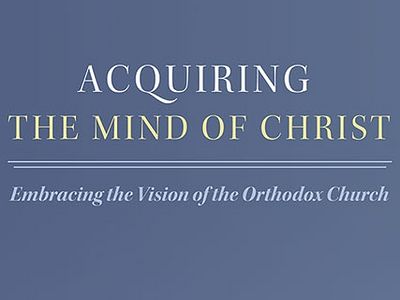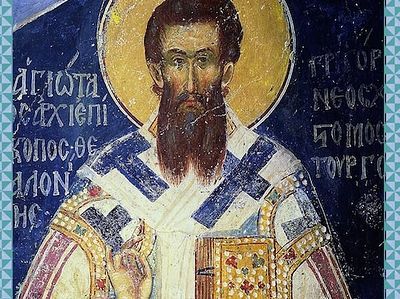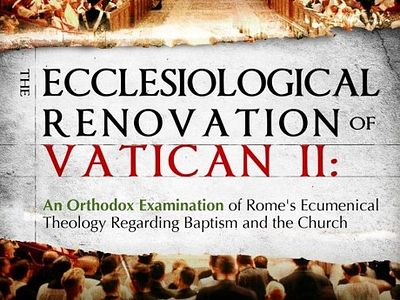On Wednesday December 9, 2015 the Canadian Hellenic Orthodox Missionary Fraternity of Toronto of Apostle Paul held a book launch in their Toronto Apostle Paul Orthodox Christian Bookstore for Protopresbyter Peter Heers' new book "The Ecclesiological Renovation of Vatican II: An Orthodox Examination of Rome’s Ecumenical Theology Regarding Baptism and the Church," which examines in depth in light of Orthodox Patristic teaching both the historical and theological road leading to the new ecclesiology promulgated at the Vatican II Council and the ecclesiology of the Council itself.
A video of the book launch can be viewed below, as well as the words of several important and notable Orthodox Church personalities today in praise of Fr. Peter's essential new book, available from Uncut Mountain Press:
* * *
Fr. Peter Heers’ book, The Ecclesiological Renovation of Vatican II, is remarkable in every way. . . . I want to congratulate the author, for he labored on his subject with objectivity and sobriety and has presented us with an important work which assists us all, especially when, due to our lack of time and many responsibilities, we are unable to have access to the sources. The book is written in an academic manner, that is, objectively, as the tradition of the Fathers of the Church designates.
Father Peter worked methodically, examining both the theological currents which preceded the Second Vatican Council and the context within which the council itself labored. Moreover, he studied in depth the texts of the council and the analyses of various theologians that followed the council.
Having read this as a dissertation many times and as closely as possible, I have come to understand how papal theology became estranged from Orthodox patristic theology and tradition; how the views of papal theologians with regard to baptism and ecclesiology developed from Blessed Augustine, Thomas Aquinas, and subsequent theologians; and how this line of thinking evolved through a variety of decisions and finally arrived at the Second Vatican Council, which then produced a new ecclesiology.
The book which we present today is very important and must be read both by theologians and the wider public. However, most especially it must be read by Bishops, and in particular those who are involved with theological and inter-Christian issues and with the theological and inter-Christian dialogues.
—Metropolitan Hierotheos (Vlachos) of Nafpaktos and Agios Vlassios
* * *
Foreword:
“Do not remove age-old boundaries, erected by your fathers.”
Proverbs 22:28
We will not remove the age-old landmarks which our fathers have set, but we keep the tradition we have received. For if we begin to erode the foundations of the Church even a little, in no time at all the whole edifice will fall to the ground.”
St. John of Damascus
In this present work the author, Father Peter Alban Heers, presents in clear and concise language an in-depth critique of two important documents of the Second Vatican Council, formally known by its Latin title “Concilium Oecumenicum Vaticanum Secundum”: Unitatis Redintegratio (Decree on Ecumenism) and the council’s chief ecclesiological document, Lumen Gentium (Constitution on the Church). Reading these documents in light of patristic texts and works of past and contemporary Eastern Orthodox and Roman Catholic theologians, Father Peter explains how the council came to conclusions which redefined who and what constitutes the Church as the Body of Christ.
We are indebted to Father Peter for helping us navigate our way through these documents and for his clarion call to vigilance as we evaluate what the council considered to be a return to the sources (ressourcement). In doing so, it would be beneficial for us to consider what St. John of Damascus counseled when he wrote, “Therefore my brethren, let us stand on the rock of faith in the Tradition of the Church, not removing the landmarks set by our holy fathers; not giving room to those who wish to introduce novelties and destroy the edifice of God’s holy, catholic and apostolic Church.”
Dear Reader, as you wend your way through the following pages make your own the following profession of St. Maximus the Confessor: “In no way will I say anything of my own, but what I have learned from the Fathers, altering nothing of their teaching.”
—Bishop Basil (Essey) of Wichita and Mid-America, Antiochian Orthodox Christian Archdiocese of North America
* * *
Foreword to the Greek Edition:
A basic presupposition for a serious theological dialogue between the Orthodox Church and the heterodox West is a thorough knowledge of Western theology. This knowledge is especially dependable when it arises from an exhaustive investigation of primary research material. Indeed, when it happens that this source material is not only important for academic research but also is the latest official text of its kind, as is the case with the Decree on Ecumenism (Unitatis Redintegratio) of the Second Vatican Council (1962–1965), then the academic and ecclesiastical interest is piqued.
As is well known, from the middle of the twentieth century, we have been engaged in an important theological dialogue with the Christian West. In particular, beginning in 1980, the Joint Theological Dialogue between the Orthodox Church and Roman Catholicism commenced its work. This dialogue, from the perspective of the West, has focused especially upon the Second Vatican Council and, in particular, upon the Decree on Ecumenism. Scholarly recognition of this point decisively aids in understanding the character of this joint dialogue.
The book which you hold in your hands by my beloved student and doctor of theology, Fr. Peter Heers, presents, in an unprecedented way, the new Roman Catholic ecclesiology from an Orthodox critical perspective. The study is academically both objective and convincing. For the first time the historical process by which Baptism was separated from the other mysteries and came to serve as a basis for the “broadening” and “extension” of the Church is exhaustively examined.
In support of his academic findings, Fr. Heers provides lengthy excerpts from the conciliar decrees and documentation, as well as from the leading theologians who drafted and interpreted the documents. With a precise theological critique of the new ecclesiology the author also presents to the reader the main points of Orthodox ecclesiology, achieving a therapeutic result. Such spiritual healing of the discord engendered by the new ecclesiology is the ultimate goal of this present study.
In addition, the author introduces forgotten contributions of Orthodox theologians, which can serve as a corrective to the views of certain contemporary Orthodox theologians and open new horizons for the Joint Theological Dialogue of Orthodox and Roman Catholics. This book thus deserves to be read both by the representatives of the Local Orthodox Churches and by those Roman Catholic theologians who participate in the theological dialogue. In this way, then, our hope (as it pertains to scholarship) for a return of Western Christianity to the patristic vision of the Church increases.
In conclusion, I would like to state that this work by Fr. Peter Heers constitutes, not simply an academic contribution to a very serious theological matter, but rather a study of an ecclesiological nature which offers a great deal to the Church today, for it opens up new horizons for every good-willed reader, whether Roman Catholic or Orthodox. At the same time it contributes dynamically to the existing theological dialogue.
—Demetrios Tselingides, Professor of Dogmatics at the Theological School of the Aristotle University of Thessaloniki
* * *
Foreword to the English Edition:
I consider it an exceptional honor that my beloved brother in Christ, the Protopresbyter Father Peter Heers, has asked me to write this foreword to the English edition of his book. My acceptance was not so much dependent on our personal friendship as upon the importance of his work and its contribution to the contemporary inter-Christian dialogue.
Ecumenism, both political and religious, is the foremost problem of our age, an age that has rightly been characterized as a “new age,” for it has witnessed not only the structural change of the world but a process of globalization, in which the mutual acceptance of all religions (πανθρησκεία) has played an essential part. It has become clear that religious dialogue, both inter-Christian and inter-religious, moves in the same direction and serves the same ends as global political objectives. This is why ecumenism, on each and every level, poses such a great challenge and temptation for Orthodoxy, because for decades now it has continued to take consciences hostage, luring them into grievous errors against our blameless Faith, causing many “of the elect” to fall as Lucifer once did.
Today the Mystery of Baptism is found to be at the center of theological reflection on account of its being the foundation of the unity of the Church, both in its local and universal aspects. Thus, as a basic element of ecclesiology and ecclesiastical identity, it was only to be expected that it would attract the attention of the inter-Christian unity dialogue, for the sake of which “baptismal theology” was created.
Fr. Heers’ book explores the issues surrounding baptism on the basis of the foundational decree on ecumenism of the Second Vatican Council (1962–1965), Unitatis Redintegratio. His study fills a gap in the related bibliography and identifies the deeper aims of this key decision of the council, which reordered the relations of Roman Catholicism with the remaining Christian world.
The author, as he makes clear in his work, possesses all the necessary qualifications to examine such a subtle and sensitive subject. He sheds light both on the presuppositions and aims of the Decree, hidden beneath its adeptly crafted façade, and on their relation to the actual objectives of the dialogue itself. The study, moreover, is the only one of its kind, penetrating into the core of both the Roman Catholic and Orthodox teachings on the Mysteries. The central element in the author’s navigation of the subject is his clarification, in the most unambiguous manner, of the entirely different presuppositions concerning baptism held by Roman Catholicism and Orthodoxy. With Fr. Heers’ study, many issues are clarified, older positions are overturned, and new research perspectives are opened up for an objective and dispassionate evaluation of the dialogue and its real prospects.
Especially noteworthy is the author’s finding that, with the Decree on Ecumenism, the Second Vatican Council added a “new dogma,” an essential departure from the consensus patrum, such that Rome, with its “new reformation,” is brought closer to Protestantism. Quite correctly, the historic path is traced, with the departures of Western theology being indicated, such that today the convergence of Orthodoxy and Roman Catholicism (as it pertains to this issue, as well) is essentially made impossible, for the reality is that there exist two different understandings. A characteristic example of this is the centuries-in-the-making separation within the Latin Church of the Mysteries of Baptism-Chrismation from the Divine Eucharist, with all the necessary consequences. This finding, as it pertains to baptism, justifies those who hold the view that the “dialogue of truth/faith” should not have succeeded the “dialogue of love” so quickly, since with regard to many issues the former is shown to be, humanly speaking, entirely impossible. A methodical transcending of the problems is not possible by skirting them and tacitly affirming the deviation (as happens now) for the sake of paving the way for the sought-after end within a context of the mutual acceptance of all religions (πανθρησκεία).
The author effectively calls attention to missing pieces of the historical and ecclesiological puzzle, which he then fills in with the unfailing guide of the ancient Christian Tradition, which remains whole and intact within the historical continuity of patristic Orthodoxy. The successive maneuverings for the sake of achieving the aims of Vatican II and facilitating the dialogue are critiqued soberly and objectively. The author’s precision in his critical analysis is successful on account of his rich knowledge of the Orthodox Patristic Tradition and the medieval and contemporary West. His critique consistently remains within the limits of frankness and yearning for an honest dialogue aimed at realization of true unity according to the words of Christ (Jn. 17, 21, 24). He rightly poses the question as to the path of Roman Catholic theology –“Ressourcement (return to the sources) or renovation?”– a question that arises from the continual Roman Catholic theological and dogmatic reassessments with respect to baptism.
In my humble estimation, this book is an essential contribution to today’s ecumenical relations and will be considered carefully. Traditional, patristic-oriented Orthodox will be pleased reading it. However, the reaction, whether positive or negative, of the “unionist” ecumenists among us is also anticipated. Appearing at a most critical juncture in the dialogue, the book fulfills the aim of its composition: to present “a critical examination of the place and understanding of Baptism in the development of the ecclesiology of the Second Vatican Council.” It goes further, however, in its closing thoughts, injecting a direct and categorical intimation: “It is ironic and tragic that precisely when the dead end of Scholasticism and Tridentine Catholicism came into sight and a beginning of a return to the Fathers was made, those Orthodox who were sought out for counsel did not guide them to the consensus patrum but were, in part, a source for further innovation.”
With respect to this last point, we are obliged to note something, which the author will, with additional experience and time, come to recognize. His point is correct, of course, that the Roman Catholic side, in seeking the assistance of its Orthodox interlocutors, was probably seeking to test the other side in order to determine the ease or difficulty of the future path of the dialogue; whereas the Orthodox, continuing the practice of the unionists of a Byzantium in decline, were ready to accept the Latin ecclesiological views without contest. (It is, of course, understood that such matters cannot be the object of a doctoral dissertation.) In the final analysis, as the author points out, the new ecclesiology of Roman Catholicism (of Congar, Bea, et al.) has clearly influenced the Orthodox side of the dialogue, as also with regard to other issues of the dialogue. It is enough for one to call to mind the Balamand agreement (1993) and all that was expressed therein.
Fr. Heers’ ecclesiological study constitutes not only a contribution to academic theology and the bibliography of the ecumenical dialogue, but also an essential critical check on the supporting discoveries of our ecumenists, such as the “baptismal” and “post-patristic” theologies. However, we would like to believe that a few of the enlightened spirits of Roman Catholic theology–fortunately such do exist–will also welcome the book and recognize its contribution.
It goes without saying, of course, that as it pertains to the Orthodoxy and completeness of the work, my elect colleague, the renowned dogmatician and supervising professor Demetrios Tselingides, is the guarantor.
—Protopresbyter George Metallinos, Emeritus Professor of the University of Athens



